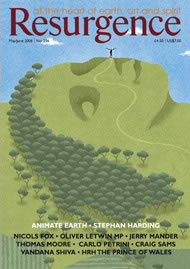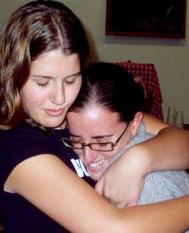THREE TEENAGE GIRLS are sitting, knees nearly touching, their ancient enmity for now foresworn, trying to make a little peace of the heart. Amal, an eighteen-year-old from the West Bank with streaked blonde hair, informs her Israeli counterpart that Muhammad was the last Prophet and the Koran the final book. “God gave us all the land. He ordered us into jihad – holy war.”
Rachel, a fair-skinned Israeli girl in blue jeans, flushes deeply. “By Jewish law, all Israel is for the Jews. By Muslim law, it’s all for the Arabs. The only way possible to fulfil these laws is by killing millions of people!”
Fatima, a dark, curly-haired Palestinian born in Israel, is caught between. “I feel lost. I’m half-half. I can imagine the little child who saw her daddy shot by soldiers in Jenin and the Israeli kid whose mummy was blown up on a bus. My father was killed. Everyone I know has lost someone. I’m sick of these leaders who only want their place in history. Stop hurting each other, that’s all I can think of.”
The three are part of a group of some thirty girls flown from a war zone to a lakeside estate deep in the heart of rural New Jersey, USA. Under the auspices of an organisation called Building Bridges for Peace, they will live together for two weeks, sleeping in one big room, their relationships a microcosm of internecine strife and a litmus test for any hope for resolving it.
“I feel like I live in the middle of a stupid world,” Rachel tells Amal and Fatima. “All that’s important to me is you, and you. We’re destined to live together in the same place at the end of the day. If I don’t know you, it’s easy to hate you. If I look in your eyes, I can’t.”
Amal shrugs elaborately. “When we’re here, who knows, maybe we’re friends. When we return, you are my enemy again. My heart is filled with hatred for Jews.” She says it bluntly, coolly, planting her flag.
Encountering the other
A child of the second intifada, Amal never met Jews who don’t wear fatigues and combat boots. “She’s one of the generation that ‘did not know Joseph’,” says Melodye Feldman, the calm American psychologist who founded Building Bridges. She has been bringing together Israeli and Palestinian teenagers for the past ten years with no other agenda than to place them in a seedbed of compassion, and hope they grow. Feldman, who had been an Orthodox Jew and staunch anti-Palestinian until visiting East Jerusalem in 1989, was inspired to act after seeing first-hand the mourning and despair among the youth of both sides. She designed a camp-style retreat for young women whose only goal was to shatter the stereotypes of ‘The Enemy’. What resulted is a sort of living lab of peace-making, its protocols developed through trial and error.
THE NEXT MORNING, one Palestinian girl confided how soldiers had come to her home, beaten her family, and upon discovering they were mistaken, left with no apology. Using a technique known as ‘compassionate listening’, Feldman asked a Jewish girl to repeat the story in the first person, then describe the emotions it had made her feel – terror, anger, revenge, sadness. The Palestinian girl burst into tears. “My enemy heard me!” The Israeli girl wept with her.
A few of the kids have been to other programmes – ‘youth diplomatic corps’, one put it a little sarcastically – the kind where issues are debated and coexistence extolled. But Feldman doesn’t want them to coexist; she wants them to care about each other. She’s insistent on keeping it personal. Fine, she tells them, keep your hate, if you must, but now just touch her hand, her face, look into her eyes, speak with your heart. These are kids who have yet to pick up a weapon, but their minds are already locked and loaded, ready to go off half-cocked.
Feldman will try anything to get them to drop their canned historical laments and encounter each other as people. They make life-masks out of plaster, moulding the wet goop over each other’s faces, tracing the unknown contours. She gets them to form a soft machine by connecting to each other with motions and sounds, or sit in a circle singing songs, patting their own legs and those of their neighbours in a blur of rhythm. The singing, the touching, and the laughter help them, when they sit in small circles and the hard ugly things are dragged into the light, to see each other without the suffocation of blanket judgements.
WHAT ARE THE root causes of war, of the millennia of hatred and strife? Some point to a key human emotion that, in individuals and nations alike, seems to drive the cycle of violence: humiliation. “People would often rather die than live with such a sense of shame,” writes one. “Even considerations of self-interest become irrelevant.”
Shame is a wound to the very sense of self. Palestinians speak of the daily humiliations of border crossings, of grinding poverty and strutting occupying soldiers. Humiliation is not just the province of the Arabs. “For Jews in general and Israelis in particular,” says a writer in the progressive Jewish magazine Tikkun, “there is a lasting form of shame associated with having been vulnerable and victimised during the Holocaust … a determination ‘never again’ to be subject to such humiliation as to be helpless prey to a ruthless predator.”
A lesson in labelling
One day, paper bags labelled with the toughest issues are put in the centre of the room, and each girl is asked to write down a phrase that best expresses her feelings about it. The responses are scrawled on big white pieces of paper and posted on the walls.
Under ‘Zionism’, an Israeli has written, “idealists who fought to come back to their country”, and a Palestinian, “an evil organisation that wants to kill all the Arabs in the world”.
Under ‘Palestine’, a Palestinian has written, “a dream that will come true, my homeland forever, my soul”, and an Israeli has scrawled, “hostile territory, a danger for my existence”.
Under ‘suicide bomber’, the Israelis write “a killer” and “a dead murderer”: the Palestinians, “a blessed person”, “a winner in the next world”, and, chillingly, “what I hope to be.”
The kids shuffle from poster to poster, subdued, disbelieving. Now it’s all been shown out in the open, every threat and calumny; their faces are ashen at this secret ballot of fear. “I see these words and I feel scared and angry and want to leave,” says one Israeli girl. A box of tissues passed round empties quickly.
They seem to recognise that something momentous is occurring. For once in their young lives, the truth has been laid bare, a force to be reckoned with – unpredictable, frightening, liberating. “These words on paper are our biggest fears,” says Fatima. “They’re what we’re hiding behind our laughing faces, being dishonest one to the other. I want to learn about them from you.”
TIME IS GROWING short. Soon they will be going home. Now it’s in earnest, the talk urgent, intimate. Suddenly they’re on fire to say everything and anything. “We haven’t finished the job we started,” Amal tells me. The signs still leer menacingly from the wall. ‘Settler’: “someone in my family I love”; “someone who deserves to be killed”. ‘Israel’: “place I love”; “place I hate”.
What they say they want in their circle today is so ingenuous: “I hope to have a best friend here, to visit each other when we get back, to meet each other’s family.” When a Palestinian says, “I only hate soldiers who kill my neighbours,” one militant Israeli, a middle-class kid, allows, “If someone was doing this to me, I might hate them, too.” One girl tells me incredulously, “I wanted them to know I have pain, too, but that’s exactly what they’re telling me!”
“Soon she’s returning to the intifada,” says Feldman. “They all are.” These children belong to families, and families to clans, and clans to villages, and villages to nations. Have these two weeks implanted an antivirus of compassion that will spread slowly through their own societies? There’s no telling how far the tentative words of peace they have spoken to each other here will reverberate.
This article is excerpted from Field Notes on the Compassionate Life by Marc Ian Barasch. It is an edited reprint from Shift magazine (No.7).
For more information please visit www.compassionatelife.com.







